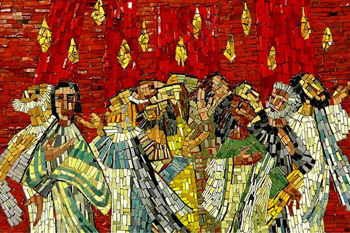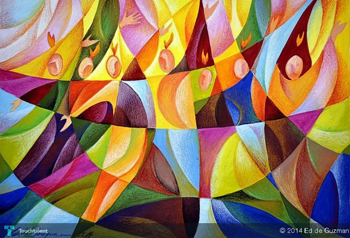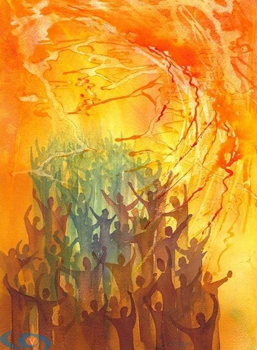For Sunday May 31, 2020
Lectionary Readings (Revised Common Lectionary, Year A)
Numbers 11:24-30
Psalm 104:24-34, 35b
1 Corinthians 12:3b-13
Acts 2:1-21
John 20:19-23 or John 7:37-39
“When the day of Pentecost had come, they were all together in one place.” This is the opening sentence of our reading from the book of Acts, and I have to confess, it makes me sad. In a literal sense, many of us can’t relate to what the sentence describes. Because of Covid-19, it is not prudent for us to be “together in one place.” We’re confined to our homes, we can’t gather for prayer and fellowship, and we don’t know when we’ll share bread and wine again around a common table. It feels difficult to contemplate togetherness — much less celebrate a great feast day like Pentecost — in this context.
But in another sense, we are in one place. We are in a hard place. A hollow place. A place of vulnerability and grief. We are together in our uncertainty. Together in our loss. Together in our hopes and fears. Across all sorts of distances — geographical, cultural, linguistic, and socioeconomic — we are bound together as one people, one humanity, one planet, facing a common threat that knows no borders. Like the disciples in our Gospel reading for this week, we are huddled together behind locked doors, waiting for Jesus to come among us and say, “Peace be with you.” Waiting for him to breathe on us. Waiting for him to speak the words we need so desperately: “Receive the Holy Spirit.”
Pentecost — from the Greek pentekostos, meaning "fiftieth," was a Jewish festival celebrating the spring harvest, and the revelation of the law at Mount Sinai. In the New Testament Pentecost story Luke tells, the Holy Spirit descended on 120 believers in Jerusalem on the fiftieth day after Jesus's resurrection. The Spirit empowered them to testify to God's saving work, emboldened the apostle Peter to preach to a bewildered crowd of Jewish skeptics, and drew three thousand converts from around the known world in one day. For many Christians, Pentecost marks the birthday of the Church.
The story Luke describes is a fantastical one, full of details that challenge the imagination. Tongues of fire. Rushing wind. Bold preaching. Mass baptism. But at its heart, the Pentecost story is not about spectacle and drama. It’s about the Holy Spirit showing up and transforming ordinary, imperfect, frightened people into the Body of Christ. It’s about God disrupting and disorienting our humdrum ways of engaging the sacred, so that something new and holy can be born within and among us. It’s about the Spirit carrying us out of suspicion, tribalism, and fear, into a radical new way of engaging God and our neighbor.
 |
Luke tells us that the disciples were “filled with the Holy Spirit and began to speak in other languages, as the Spirit gave them ability." "At this sound the crowd gathered and was bewildered, because each one heard them speaking in the native language of each."
Those of us who speak more than one language might be the best equipped to grasp the import of this miraculous moment. Those of us who are bilingual (or better yet, well versed in many languages) understand implicitly that a language equals far more than the sum of its grammar, vocabulary, and syntax.
Languages carry the full weight of their respective cultures, histories, psychologies, and spiritualities. To speak one language as opposed to another is to orient oneself differently in the world — to see differently, hear differently, process and punctuate reality differently. To speak across barriers of race, ethnicity, gender, religion, culture, or politics is to challenge stereotype and risk ridicule. To attempt one language as opposed to another is to make oneself a learner, a servant, a supplicant. It is a brave and disorienting act.
Has there ever been a time when we’ve needed such brave, border-crossing acts more acutely than we do right now? As the world grows more and more tribal; as nations, cities, and even faith communities turn on each other out of suspicion and selfishness; as we’re forced by the pandemic to physically separate from those around us, can it be that God desires to pour out the Holy Spirit on us, so that we might learn new and life-giving ways of being the Church, being the Body, being Love incarnate for a frightened and imperiled world? What languages do we need to speak right now that we’ve never spoken before? Where does the fire need to fall, to burn away all that hinders us from being bearers of Good News in this dark time?
When the disciples and their friends began to speak in foreign languages, the crowds gathered outside their meeting place understood them. And this — the fact of their comprehension — was what confused them. They were not confused by the message itself; the message came through with perfect clarity in their respective languages.
 |
What the crowds found baffling was that God would condescend to speak to them in their own mother-tongues. That he would welcome them so intimately, with words and expressions hearkening back to their birthplaces, their childhoods, their beloved cities, countries, and cultures of origin. As if to say, "This Spirit-drenched place, this fledging church, this new Body of Christ, is yours. You don't have to feel like outsiders here; we speak your language, too. Come in. Come in and feel at home."
As Christians, we place great stock in language. In words. Like our Jewish and Muslim brothers and sisters, we are People of the Book. We love the creation stories of Genesis, in which God births the very cosmos into existence by speaking: "And God said." "In the beginning was the Word," we read in John's dazzling poem about the Incarnate Christ. On Sunday mornings, we profess our faith in the languages of liturgy, creed, prayer, and music. In short, we believe that language has power. Words make worlds. And unmake them, too.
What I love about the words and languages unleashed at Pentecost is that their articulation required surrender and humility on both sides. Those who spoke had to brave languages far beyond their comfort zones. They had to risk vulnerability in the face of difference, and do so with no guarantee of welcome. They had to trust that no matter how awkward, inadequate, or silly they felt, the words bubbling up inside of them — new words, strange words, scary words — were nevertheless essential words — words precisely ordained for the time and place they occupied.
Meanwhile, the crowds who listened had to take risks as well. They had to suspend disbelief, drop their cherished defenses, and opt for wonder instead of contempt. They had to widen their inner circles, and welcome strangers with accents into their midst.
Not all of them managed it — some sneered because they couldn't bear to be bewildered, to have their neat categories of belonging and exclusion explode in their faces. Instead, like their ancestors at Babel, who scattered at the first sign of difference, they retreated into the well-worn narrative of denial: "Nothing new is happening here. This isn't God. These are blubbering idiots who've had too much to drink."
 |
But even in that atmosphere of suspicion and cynicism, some people spoke, and some people listened, and into those astonishing exchanges, God breathed fresh life.
Something happens when we speak each other's languages. We experience the limits of our own words and perspectives. We learn curiosity. We discover that God's "great deeds" are far too nuanced for a single tongue, a single fluency.
I hope that the Pentecost story compels us, because it's a story for this time, this moment. As we continue to face the coronavirus pandemic as people of faith, we will be tempted to grow complacent, or to despair, or to turn in on ourselves and forget that we are part of a much larger whole. We live in a world where words have become toxic, where the languages of so many cherished "isms" threaten to divide and destroy us. The troubles of our day are global, civilizational, catastrophic. If we don't learn the art of speaking across the borders that currently separate us, we will burn ourselves down to ash.
It is no small thing that the Holy Spirit loosened tongues to break down barriers on the birthday of the Church. In the face of difference, God compelled his people to engage. In the face of fear, Jesus breathed forth peace. Out of the heart of deep difference, God birthed the Church. So happy birthday, sisters and brothers. Receive the Holy Spirit. Together, may we grow into all that Christ longs to pour into us, his Body.
Debie Thomas: debie.thomas1@gmail.com
Image credits: (1) Catechist's Journey; (2) Princeton United Methodist Church; and (3) The Evangelical Lutheran Church of the Holy Trinity (New York City).





